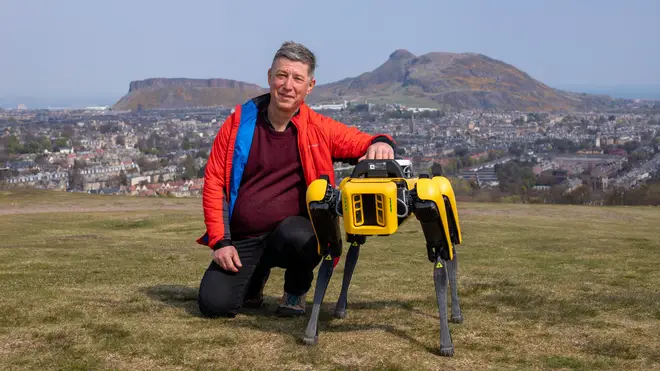
Iain Dale 7pm - 10pm
2 June 2021, 08:14

The four-legged machine based at the National Robotarium is believed to be the first of its kind in Scotland.
A four-legged robot “dog” is helping scientists in Scotland research how the machines can help people working in hazardous environments such as oil platforms and refineries.
Experts at the National Robotarium, based at Heriot-Watt University in Edinburgh, are fitting the robot with “telexistence” technology, which lets humans experience an environment without being there, using devices like microphones and cameras to relay sounds and videos.
The £60,000 robot, believed to be the first of its kind in Scotland, is part of the “Spot” range created by Boston Dynamics and has also hit the headlines dancing on YouTube.
Scientists will use the new hardware to carry out research into how robots can support humans in hazardous environments such as offshore energy inspection and disaster recovery.

Professor Yvan Petillot, professor of robotics and autonomous systems at Heriot-Watt University and co-academic lead of the National Robotarium, said: “Fitting this robot with our telexistence technology means we can carry out a range of experiments.
“We can test how the robot can help and support people working in hazardous environments, including oil and gas platforms and oil refineries.
“In search and rescue operations or following accidents, Spot robots fitted with our sensors could monitor a casualty’s vital signs and transmit images and sounds back to a hospital, allowing doctors to offer advice on treatment or decide when it’s safe to move a patient.
“Robots of this design can climb over rubble, walk up and down stairs, and cope with hazards like dust and rain.
“These features will prove very useful as we develop more ways to ensure robots can help keep people safe and save companies money.”
The National Robotarium is a partnership between Heriot-Watt University and the University of Edinburgh.

Dr Sen Wang, an associate professor at Heriot-Watt University and robotics and autonomous systems lead at the National Robotarium, added: “Through a project with the ORCA Hub, the first application for our research with this new robot will be supporting the construction industry.
“We are going to fit lidar to our robot, which is similar to radar but uses light instead of radio waves.
“That will allow the robot to build up a picture of its surroundings while spotting obstacles like rubble on construction sites.
“Our Spot, however, is unique. We have set it up to be a moving data collector and data centre, equipped with advanced telepresence solutions. When we deploy it on construction sites, it will collect and measure in real time, relaying the data to multiple experts at once, all around the world.
“This means construction companies, regardless of their location, can benefit from worldwide expertise.
“Using Spot in this way has the potential to speed up the construction process, reduce costs of re-work, detect hazards, increase efficiency and improve quality control.”
Children in the area covered by the Edinburgh & South East Scotland City Region Deal are also being invited to enter a competition to name the “robot dog”, which will then visit the winning school, and can enter at https://sway.office.com/A2wPskFAlkgKAwG9